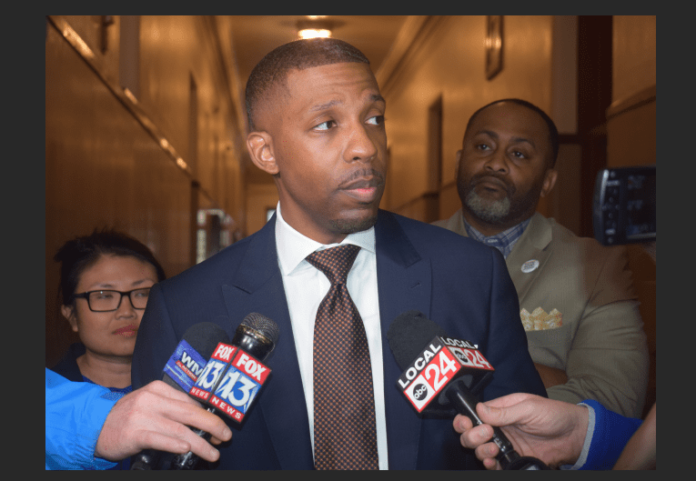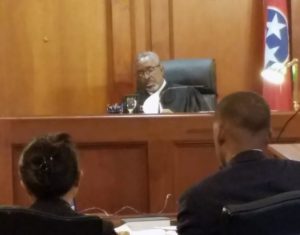
Mindful that Early Voting is more than two-thirds complete and that Election Day is Nov. 6, Chancery Court Judge JoeDae Jenkins on Thursday ruled in favor of plaintiffs seeking judicial helping regarding 4,000 to 6,000 disputed voter registration forms.
The ruling came with an order for the Shelby County Election Commission to devise a helpdesk process for Election Day that mirrors the process now in place during the Early Voting period.
In addition, the commission was ordered to provide the plaintiffs with a daily list (beginning Oct. 26) of the 4,000 to 6,000 applicants processed and to immediately notify the applicants of their status and the reason why their forms had not led to valid voter registration cards.
The ruling, which is being appealed by the Election Commission, was sought by the Memphis Branch NAACP, The Tennessee Black Voter Project and several individuals convinced that the Election Commission was on the wrong side of the law by holding up voter registrations without proper notification to individuals.
“Failure to provide the applicant with notice that there is a deficiency (in their form) denies them of due process under the law,” Jenkins said, revealing his decision at the end of hearing that began at 11 a.m. and stretched several hours into mid-afternoon
“The harm to the applicant far outweighs the harm to the Shelby County Election Commission in requiring it to afford the relief this court will order.”
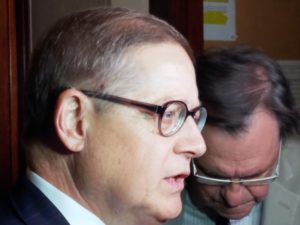
Attorney John Ryder, who represents the Election Commission, said Jenkins erred and that the decision warranted the emergency appeal that would be made. During the hearing, he argued that the plaintiffs had to prove irreparable harm and that no such harm had been done or would be.
“No one is being denied the right to vote,” he said, adding the option of casting provisional ballots was there for those whose registration raised Election Commission concern.
Any time this close to an election that such changes are ordered, a burden is put on the process of making sure elections run smoothly, said Ryder.
Alexander Wharton, who represented the NAACP and The Tennessee Black Voter Project, along with Bo Dul, said, “We’re willing to help out. This is not an adversarial thing. But sometimes you have to push people from, a legal standpoint, to get them to do what they are required to do by law. That’s what this was about.”
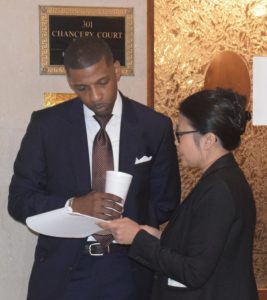
With the names provided, Wharton said his clients would reach out to those whose applications were set aside because of issues flagged by the Election Commission, letting them know that they can correct the items that need to be addressed. The Election Commission’s appeal was to be expected, he said.
“But at this juncture, Chancellor Jenkins’ ruling stands. We think it is the correct ruling based upon how the statute reads. That’s why we were very clear. We’re not arguing policy or best-case practices or anything like that. We’re arguing what the law said and requires of the Election Commission.
Election Commission Administrator Linda Phillips testified that the commission received a large number of registration forms – “something in the neighborhood of 40,000 in the last week.” An estimated 12,000 of those came on the last day (Oct. 9).
Notices are mailed to applicants with incomplete forms, she said. “Some of these cannot be cured. They’re missing names. Even if I wanted to contact some of these voters, they are apartment complexes and there is no number on them. …There is no phone number…We’ve had a great deal of difficulty processing a number of these forms.”
Phillips said additional people were hired, more equipment was brought in and workers operated in two shifts, with a third shift being contemplated. She brought examples of what she said were incomplete applications, including street names and numbers that reportedly did not exist.
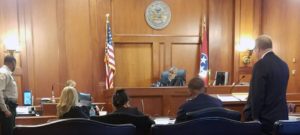
Most troubling, Phillips said, were scenarios such as the one where there were three applications with the same name, date of birth and Social Security number and different addresses. Two were filed on the same day and the third on another. That set up the possibility of Election Day fraud she suggested.
Under the helpdesk process the plaintiffs want in place on Election Day, a voter that showed up at all three locations would vote with no way to track. Phillips advanced the merits of voters casting provisional ballots when their registration indicated there was an issue.
“They are not required to show proof of address when they vote. Their photo ID simply has to be unexpired and their name and photo on it. Unlike states that do same-day registration, where you have to bring in proof of your actual address, Tennessee doesn’t require that.
“So the cure is you vote wherever you think you are eligible to vote on a provisional ballot and then you figure out which one of these three forms you actually live in,” she said. “Our polling places are not connected. To run a help desk is not possible.”
Early Voting sites are connected electronically.
Phillips produced a recent memorandum of understanding from the state election coordinator and said it was the guide being used locally to process voter registration forms.
Wharton pressed to determine if Phillips was concerned about the 4,000 to 6,000 citizens whose applications were in what he called “voter purgatory.”
“Of course I am,” Phillips said. “I want every citizen in Shelby County who is eligible to register to vote to register. …On the other hand, I don’t want fraudulent voters to vote. That is my issue.”
While it did not come up in testimony, some observers of the voter registration push have alluded to voter registration workers violating the process in pursuit of getting paid for the volume of forms produced.
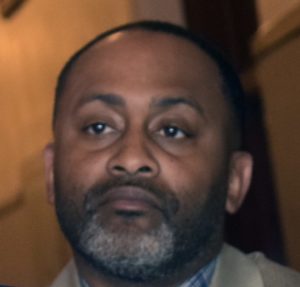
The Rev. Earle J. Fisher with Up the Vote 901 and connected to the Tennessee Black Voter Project said a governing memorandum of understanding “let’s you know that anybody who you hire cannot be held to a certain quota in terms of the number registered.”
Referencing Phillips testimony, Fisher said, “You didn’t see anything that was so egregious and automatically qualifying as fraud. These could have been the most simple of oversights. Somebody didn’t know exactly which addressed they would be registered to, so they registered a couple of times. Every time they checked, they see the last registration had not gone through, which means the Election Commission could have just been holding that paper registration.
“You never heard about somebody trying to forge a Social Security number,” he said. “Issues in regard to addresses I would want to see the exhibit because they can say that a certain street does not exist, but it could have been a misspelling.”
There was no detailed and thorough presentation that “validates somebody’s skepticism around so many registrations being brought forth,” he said. “It almost seems to reek of this suspicion (that) because people are getting actively involved in the process something must be wrong.”
In detailing his ruling, Jenkins made note of the section of the state code that Ryder said governed the heart of the matter. Jenkins said he did not see that section as governing the issue in question. Instead, he ruled that the section relied upon by Wharton and Dul was the one that should be applied.
Jenkins also noted that provisional ballots might have a “chilling effect on the voting process.” The public’s interest is best served by a process that allows for the timely participation of as many voters as possible, he said.
“Both parties have suggested that Tennessee is on the bottom rung of voter participation. The court’s ruling will facilitate, hopefully, an increase in voter participation.”
Early Voting runs through Nov. 1. Election Day is Nov. 6



